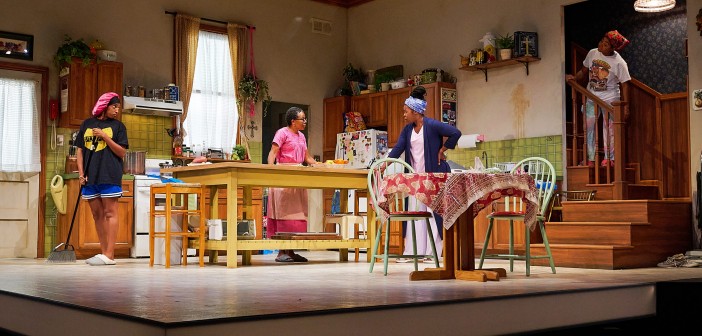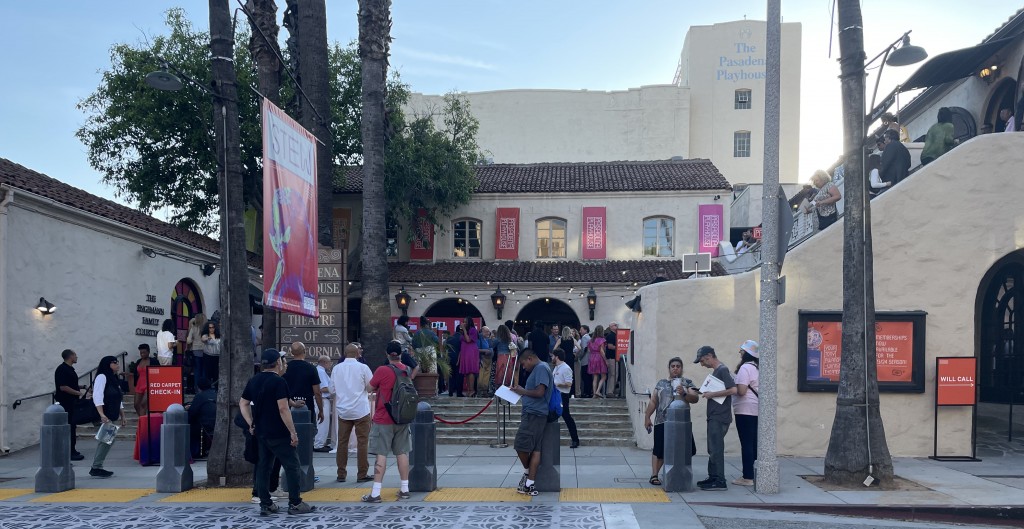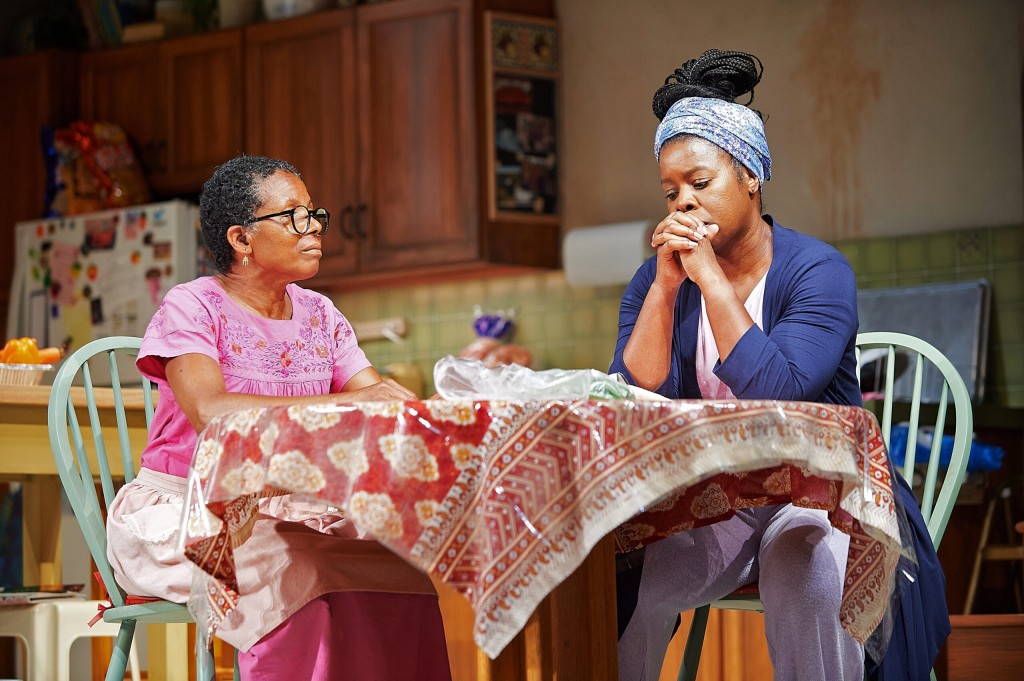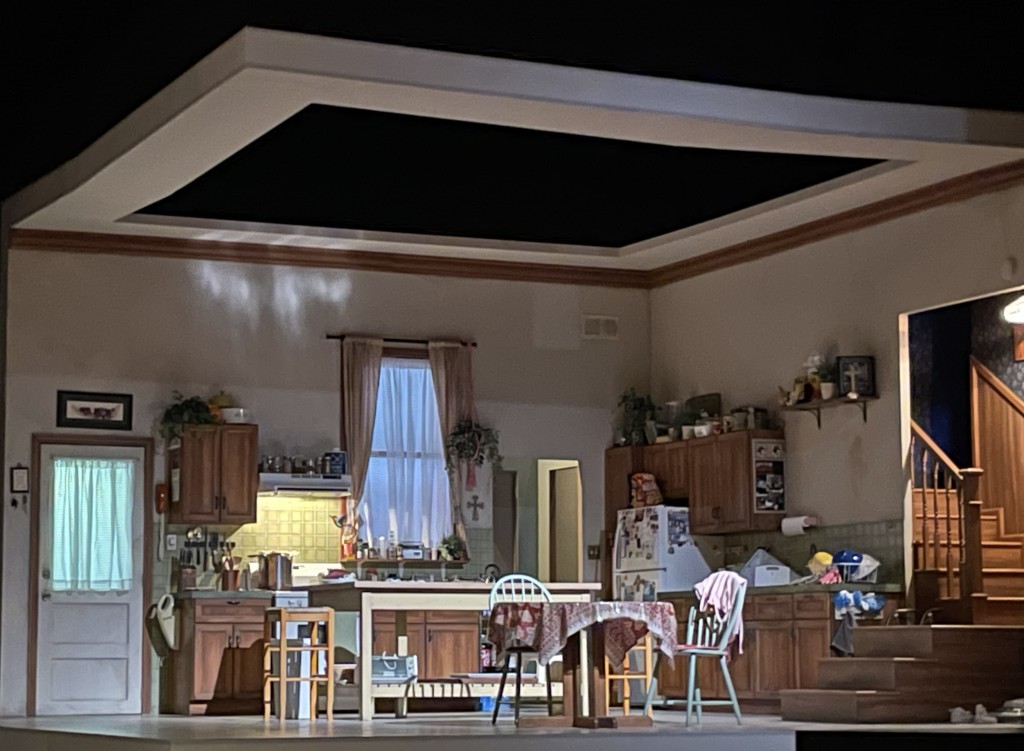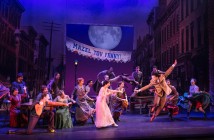STEW
There is so much to say about this wonderful play at the Pasadena Playhouse! And for once, it’s all positive!
But before I get to my review, I have to majorly congratulate this venerable theatre for being the recipient of the 2023 Regional Theatre Tony Award in June. Even though I’m only an audience member at this State Theater of California, I felt such pride when they received that very special award at last month’s Tonys. Big kudos to them.
Stew by Zora Howard is a play about the family dynamics of a mother, her two daughters, and one granddaughter in a New York town circa 2000. It all takes place in the matriarch’s kitchen, with the action being…making stew, of course!
And it’s a riot. There is some seriousness to it, but I was laughing so hard most of the time that I can’t categorize it as anything but a hilarious comedy. There are sooooo many clever lines; it’s just about one right after the other. My absolute favorite is when the grandmother, Mama, is coaching her granddaughter on how to do a scene from Shakespeare. The girl is just saying her lines and the grandma is trying to get her to feel what’s happening. The frustrated girl asks why she can’t just say the lines, and Mama answers matter-of-factly, “Oh, you can just do the words and not get the part.” Every actor in the world understands that one. And LisaGay Hamilton’s delivery, of every line, is absolutely spot-on.
It did take me a while to understand who all the characters are to each other, (because the actresses’ ages aren’t totally apparent, especially to those of us in the back of the theatre,) so I’ll clear it all up for you now. There’s the matriarch, Mama, played by LisaGay Hamilton; her grown-up married daughter, Lillian, played by Roslyn Ruff; her teen-age daughter, Nelly, played by Jasmine Ashanti; and Lillian’s daughter, Lil’ Mama, (whose name is very confusing, and I had no idea what age she’s supposed to be,) played by Samantha Miller.
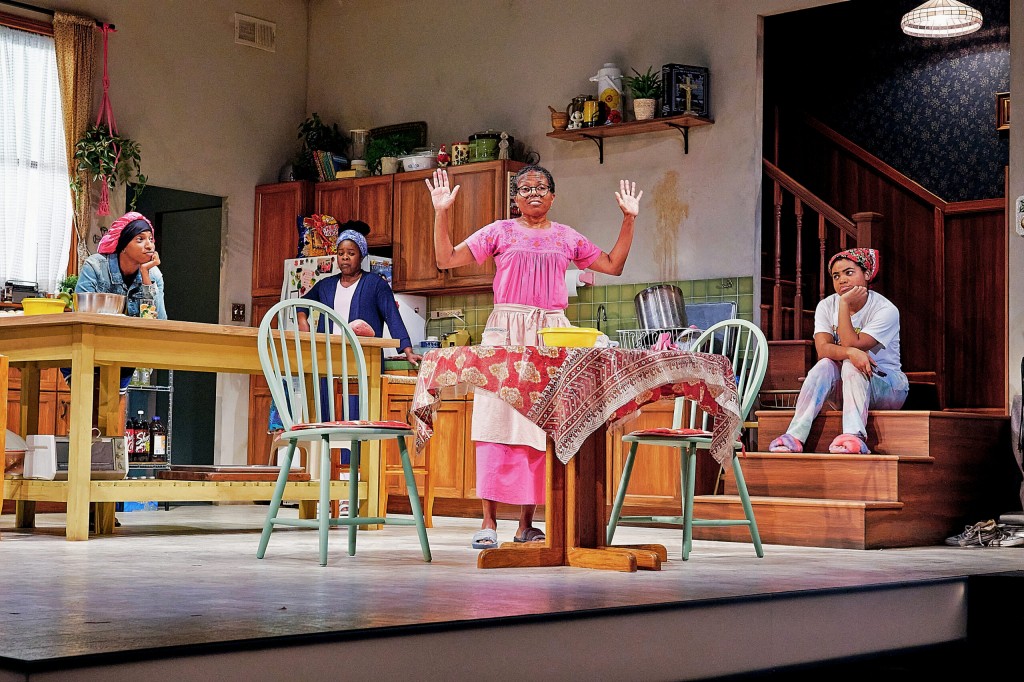
Jasmine Ashanti, Roslyn Ruff, LisaGay Hamilton, and Samantha Miller. Photo by Mike Palma, as is the one at the top of this review.
And they’re all excellent! Especially Ms. Hamilton. Every actress should study her. I don’t understand how I’ve missed all of her prolific work until this past television season, on Will Trent, although I feel that I’ve always known of her. (And when I saw her on that TV show, the first thing I thought was how cute her petite face is!)
I rarely talk about the playwrights, but this time I feel compelled to. Ms. Howard was in attendance on opening night, but didn’t stand when introduced before the show, which means I didn’t see her. So, watching the play, with her brilliant and wise writing, I pictured her as a senior citizen, looking somewhat along the lines of Della Reese. And then when I researched her afterwards, I discovered that she’s an absolutely adorable very young lady! I have no idea how she was able to depict these generations of women so perfectly. And I believe that Stew is actually her first play! It boggles the mind.
Of the narrative itself, I absolutely adore that Mama often corrects the others on grammar, as I always do! She starts it off pretty early, when a character uses “lay” instead of the proper “lie.” (You lie down, not lay down. “Lay” is the past tense of “lie.” That common mistake is like nails on a chalkboard to me—I recently even corrected a new doctor on it! Yes I did.) I was wishing the play was a TV show right then, so I could go back and hear that part over and over again.
The comedy and small grammar lessons are not the only bits of Stew I appreciated. Both my parents were teachers, so I grew up with my best friend in the world, Edna, cooking for me us, which meant I never learned to do it myself. (Even when I begged Edna to let me try, she said it was easier for her to do it herself.) And then I was a restaurant critic for so many years, (including still now,) so I had no need to cook myself. Until the pandemic—I wouldn’t eat food that someone else’s possibly-germy hands had prepared! So now I agree with the women in this show on the importance of knowing how to cook. (But I still never cooked a stew. Perhaps the program should include a recipe the next time this play is produced somewhere.)
So the show is in small part a cooking lesson, as well, if you pay attention—we learn how to make dumplings and get vegetables ready. The stage is high enough to see the action even from the back of the theatre without craning our necks.
And the set by Tanya Orellana rings so true for me. Even though many cultures, (Jewish, Italian, Latino, Greek,) have histories of cooking big meals together, I’m, perhaps surprisingly, most familiar with the Black tradition. Although I’m White, the people I consider my second family are Black, and when I saw them regularly for many years, we all gathered around the grown-ups’ kitchen all the time, often waiting with bated breath for Mr. Hazel’s famous meatloaf! The kitchen was a fraction of the size of the one on stage, but we all still hung-out in there together. (One of my proudest gifts I ever gave anyone was a sign from my very first Candid Camera prank, which said “Emma’s Kitchen” in big beautiful blue letters. I can’t believe I was brave enough to ask the producers for it on my very first gig for them, nor do I have any idea how I got it cross-country to Rhode Island, but the matriarch, Emma Hazel, loved it; I got such a kick out of seeing it still on the wall of her kitchen on all my subsequent trips.) So I can attest to how authentic the set of Stew is, and tell you seeing it gave me such a warm feeling.
I must admit that the ending of Stew confused me a bit. I know what happens there, but I’m not sure what it means for all the action that comes before it for an hour and a half. But for the first time ever, I haven’t dwelled on it. I’m just happy that I was so entertained for the duration.
I would have asked some other opening nighters to explain it to me, but when I saw a gigantic pot of—what else?–stew at the after-party, I lost every other thought in my head except for how absolutely clever that was!!! And it was delicious—smoked turkey and vegetables in an excellently-seasoned broth! It was the perfect way to end a very fun evening, so the explanation of the play’s ending will have to wait until another time. (But if you want to explain it, please feel free to do so in the Comments below. Just please try to not spoil it for the readers who haven’t seen the play yet.)
Stew running through August 6, 2023
Pasadena Playhouse 39 South El Molino Avenue, Pasadena
626-356-7529 www.pasadenaplayhouse.org

